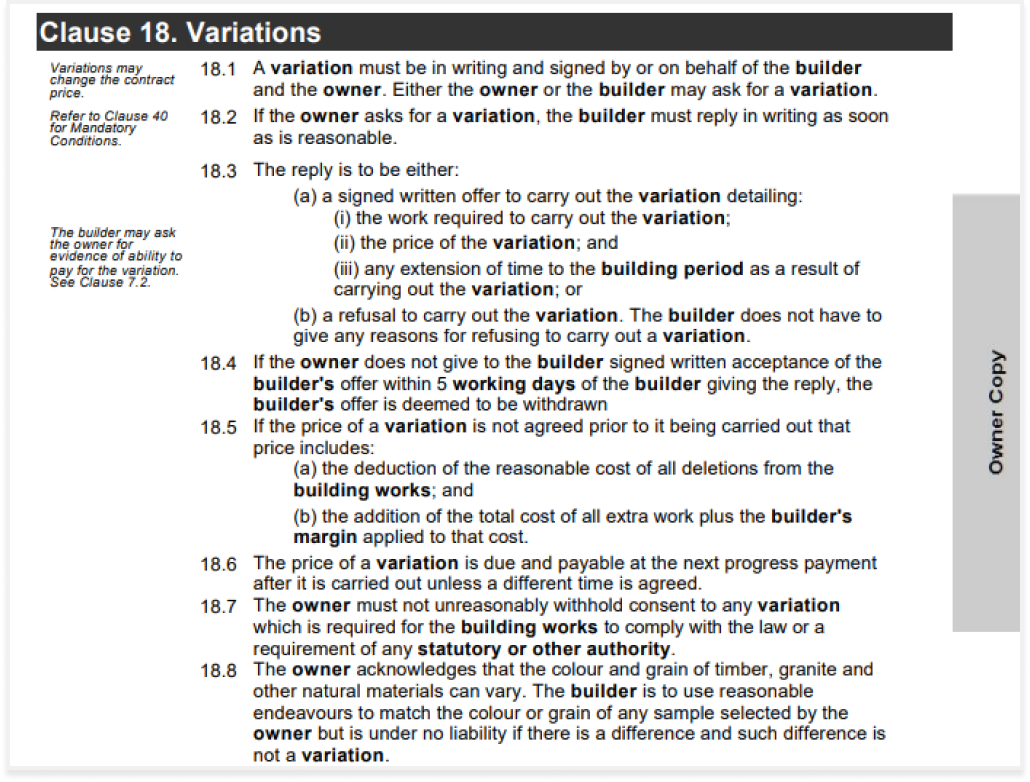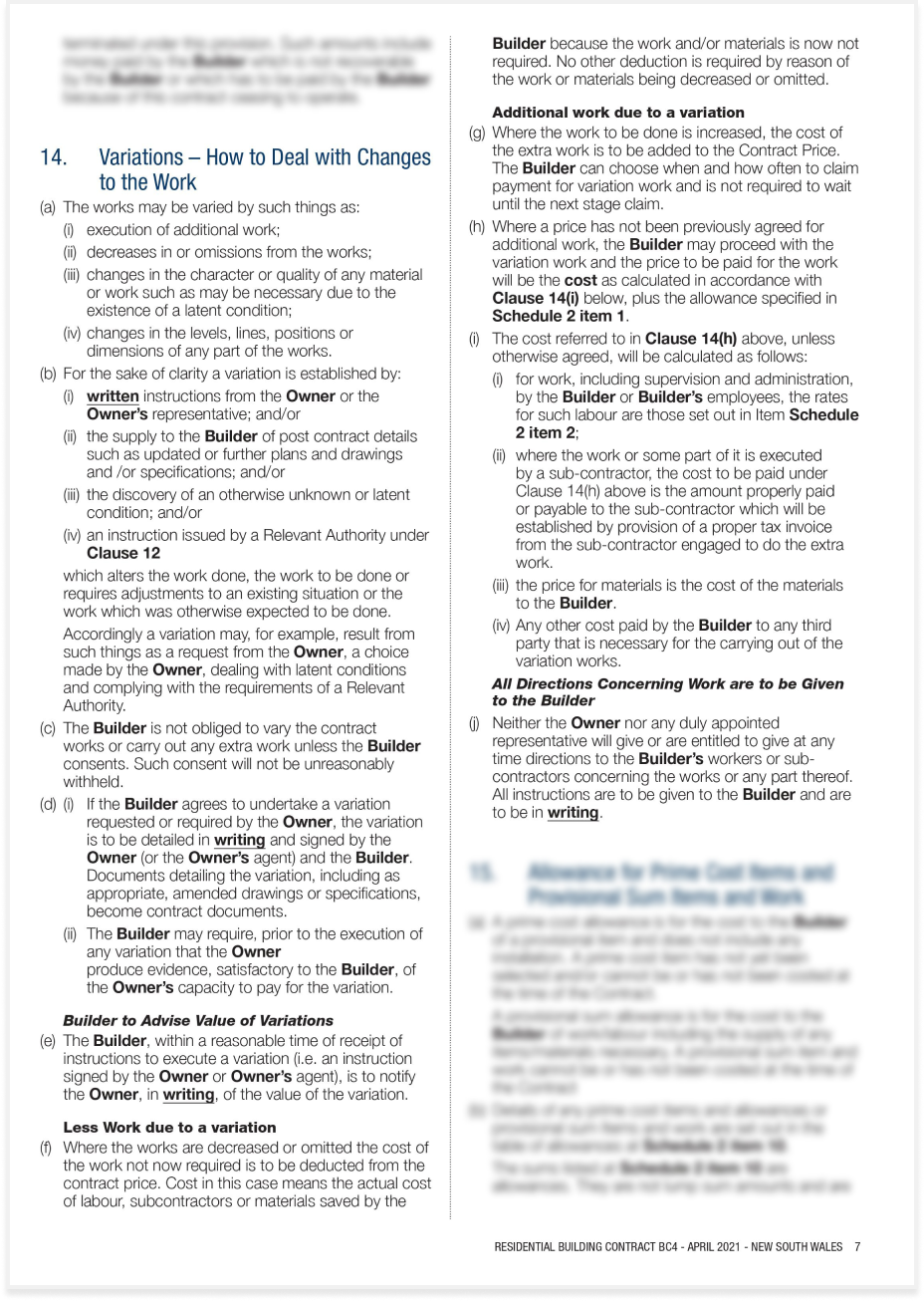The Law: Home Building Act
The Home Building Act expressly provides circumstances where the Builder is not entitled to compensation, save for on a quantum meruit basis. Section 94 of the Home Building Act 1989 (NSW) reads:
Effect of failure to insure residential building work
(1) If a contract of insurance required by section 92 is not in force, in the name of the person who contracted to do the work, in relation to any residential building work done under a contract (the “uninsured work” ), the contractor who did the work–
(a) is not entitled to damages, or to enforce any other remedy in respect of a breach of the contract committed by any other party to the contract, in relation to that work, and
(b) is not entitled to recover money in respect of that work under any other right of action (including a quantum meruit).
(1A) Despite section 92(2) and subsection (1), if a court or tribunal considers it just and equitable, the contractor, despite the absence of the required contract of insurance, is entitled to recover money in respect of that work on a quantum meruit basis.
A more common circumstance that prohibits the builder claiming compensation for works performed for on a quantum meruit basis is when the Builder fails to comply with the terms of their home building contract.
This is a screenshot of the NSW HIA Contract variation clause that the Builder must comply with.


The NCAT has discussed the principles of quantum meruit in many recent cases including:
- Suecha Pty Ltd v VSD Glass & Timber Pty Ltd [2020] NSWCATAP 170;
- Woodward v Warwick Green Building Pty Ltd [2021] NSWCATAP 210;
- Rekrut and Scott v Champion Homes Sales Pty Ltd [2017] NSWCATAP 187;
- Roude v Helwani [2020] NSWCA 310;
- Rice v JR and SD Farmer t/as Urban Bespoke Homes [2020] NSWCATAP 208; and
- Paraiso v CBS Build Pty Ltd [2020] NSWSC 190.
The Principal and Elements of Quantum Meruit
Senior Member Thode in Durastyle Homes Pty Ltd v Gosling; Gosling v Durastyle Homes Pty Ltd [2022] NSWCATCD 106 expressed the principles and elements of quantum meruit succinctly as follows.
“88. If the quantum meruit claim involves an unenforceable variation, the builder must prove the homeowner had actual knowledge of the additional works; that the works were outside the contract; and the builder expected to be paid for the additional work.
89. In respect of all quantum meruit claims, the onus is on the builder to establish the reasonable value of the work that performed and accepted by the homeowner. This is a question of fact. Relevant evidence will include any invoices/receipts of the builder; time sheets of the builder; rates under the contract for labour and materials; and expert evidence that analyses the work actually performed and the reasonable cost of such work.
90. The amount recoverable in a quantum meruit claim cannot exceed the amount that would have been payable under the contract for that component of the work.”
What is Quantum Meruit?
Quantum meruit is a Latin phrase that translates to “what one has earned” or “what the job is worth”. In a legal context, it refers to a claim made by a builder for compensation for work completed without a formal agreement in place. This can happen when a contract is terminated before completion, or if there was no contract in place to begin with.
The principle of quantum meruit is based on the idea that builders should not be left without compensation if they have performed work for a homeowner. The courts will take into account a number of factors to determine the fair and reasonable value of the work performed, including the cost of materials, the cost of labour, and the complexity of the work.
Mann v Patterson Constructions Pty Ltd
The most recent High Court authority where quantum meruit was at issue is Mann v Patterson Constructions Pty Ltd. In this case, the homeowners, Peter and Angela Mann, engaged Patterson Constructions to build double-storey townhouses on their property. Before the completion of the second townhouse, the Manns asserted that the builder had repudiated the contract and terminated the contract. The builder then claimed compensation for the fair and reasonable value of the work performed, including 42 variations directed by the Manns.
The case went through several rounds of appeals, with the builders arguing that they were entitled to compensation on a quantum meruit basis. The homeowners argued that the builders were not entitled to such compensation, as they had a contractual claim available.
In the end, the High Court found that the builders were not entitled to claim compensation on a quantum meruit basis, as they had accrued a right to payment under the contract. However, the Court did note that there may be circumstances where it is appropriate for a builder to recover an amount greater than the contract price, but this would be in exceptional cases only.
The Onus is on the Builder
It is important to note that the onus is on the builder to establish their entitlement to compensation under quantum meruit. At a minimum, the Builder must prove that they have performed work, that the work has been accepted by the homeowner, and that the homeowner has been unjustly enriched by the work.
Protecting Yourself as a Homeowner
As a homeowner, there are steps you can take to manage your risk and defend yourself against a quantum meruit claim from a builder. Here are a few key things to keep in mind:
- Have a written contract in place. This will clearly outline the scope of work, the cost, and the payment schedule.
- Keep detailed records of any variations or changes to the scope of work. Owners should not consent to any change to the contract works other than as provided by the terms of the contract. This will help to establish whether the builder has a valid claim for additional compensation.
- Keep records of any payments made to the builder. This will help to establish whether the builder has already been paid for the work in question.
- Seek legal advice if you are unsure of your rights or if you are facing a quantum meruit claim from a builder.
- The moment you identify that the Builder has deviated from the contract, you should express clearly and consistently in writing your objection. You should require the Builder to remedy the non-conformance with the contract.
- Owners should be mindful that emails and text messages along with evidence of costs incurred may be sufficient evidence for the Builder to establish their quantum meruit entitlement.

Legal Advice
Homeowners should engage a construction lawyer if they have received a claim for works which is not consistent with the terms of the contract.
Contracts Specialist is a specialist building and construction law firm based in Sydney. If you are a homeowner and have received claims for payment beyond the contract or quantum meruit claims then call John Dela Cruz for a free 15 minutes consultation.




